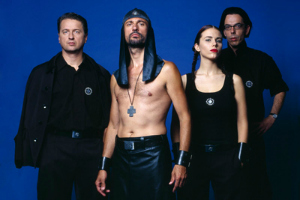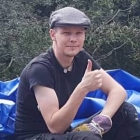
You have been working a couple of years with the new album, did it turn out the way you thought and were there allot of changes during the course of creation?
- "We didn't really work all the time on the album, the real work actually happened during the last year. Of course we were changing things during the process, and it worked out pretty much as we wanted it to be."
How do you think the new album distinguish from the other albums?
- "Well, it's about a different subject. We worked with some different collaborators. I mean, every album distinguish from the others somehow. That's something you have to define really, how much does it distinguish for you? Because we have been working on it for so long that in the end we kind of lost the critical distance."
On what bases do you choose songs to do covers of?
- "There is a very diverged basis. We don't really use one model for deciding what way we're going to do covers. We got several different methods to work and it really depends on what subject we are dealing with and what approach we want to take, very diverge."
Is there any song that you wanted to do a cover of but the ones with copyright refused?
- "Not really, No."
Is it true that you almost were sued by The Beatles for your 'Let it be' album?
- "No, that's not true. We were almost sued by Opus Dei for using the name 'Opus Dei'. The catholic Opus Dei, not the group."
How come you choose to sing in English and in German but not in your native tongue?
- "We do use our native tongue as well. There is one song on this record and there are many records with our native language. But there is no native language. Native language doesn't exist anymore. We live in basically global times. We all use different languages, even when we use our own language we use allot of German or French words without even knowing it. The Slovenian language, the Swedish, they all belong to one. A big family of languages which we kind of interrelate constantly."
Your albums have a kind of dark atmosphere; do you think the world is as dark as your songs reflect?
- "We like every colour as long as it's black. The black atmosphere is probably because our music has some depth, and if it's really deep you don't see the end of the tunnel."
You have played for about 23 years and that's kind of a long time, have you ever been tired of it and wanted to quit? And if that's true, what's kept you going?
- "It's something we have to do. It's not that we have chosen what we're doing. Basically, we were in a way chosen like everybody is chosen. Everybody is chosen to do certain things. By hire, authority or whatever it is. You can not decide entirely what you going to do in your life. It's simply that you start to do something and that's it. You can only develop it. We get tired when the weather isn't nice, the food doesn't taste good and we do too much interviews, because we are in the end just biological machines."
I saw you play at the Wave Gotik Treffen and at that point you didn't use the co-side drummers, but at the Electric Gathering Festival you did. At which point did this change happen and how did you come up with the idea?
- "We do different programs for different locations. It depends very much on which programme we are going to do. For Wave Gotik our new programme was not ready yet so we so we decided to do the old one. It was the Jesus Christ Superstar programme which really fits the event."
There is allot of different ways to express the way of performance and lyrics. What do you think mainly is the way for you to express yourselves? Do you ever use irony or other influences?
- "We try to avoid using irony, because at a certain extent you can get ironic this days very easily. So we are absolutely serious. But we use all kind of aims that we feel at some point to be useful for the content we try to create. But it's not that we only concentrate on irony, parody or something like that. It's a mixture of all different spices just like good food."
Could you tell me a little more about the NSK?
- "Well, NSK was originally created 1984 by several different groups in Libiania, Slovenia. It was in a way initiated by Laibach because it was the first group and later on it has developed into some kind of informal organisation. A creative organisation which also worked very much with social and political contexts. We did some projects together. Some projects made by separate groups entirely. It has developed to the point which we decided to do the state of NSK in 1992 and after the brake of Yugoslavia we decided to create our own state because we believe that all artists need to have a relation with some kind of higher authority. A state, a market or some ideology, yes. We created our own state which does not have a territory, but it's a state in time."
Is there any last words you would like to say to our readers?
- "Well, you know, Laibach gives so many different opportunities for different interpretations so it could only be whatever anybody thinks."
This interview was made 2003 and initially published on Neurozine.com
Sep 24 2003
- "We didn't really work all the time on the album, the real work actually happened during the last year. Of course we were changing things during the process, and it worked out pretty much as we wanted it to be."
How do you think the new album distinguish from the other albums?
- "Well, it's about a different subject. We worked with some different collaborators. I mean, every album distinguish from the others somehow. That's something you have to define really, how much does it distinguish for you? Because we have been working on it for so long that in the end we kind of lost the critical distance."
On what bases do you choose songs to do covers of?
- "There is a very diverged basis. We don't really use one model for deciding what way we're going to do covers. We got several different methods to work and it really depends on what subject we are dealing with and what approach we want to take, very diverge."
Is there any song that you wanted to do a cover of but the ones with copyright refused?
- "Not really, No."
Is it true that you almost were sued by The Beatles for your 'Let it be' album?
- "No, that's not true. We were almost sued by Opus Dei for using the name 'Opus Dei'. The catholic Opus Dei, not the group."
How come you choose to sing in English and in German but not in your native tongue?
- "We do use our native tongue as well. There is one song on this record and there are many records with our native language. But there is no native language. Native language doesn't exist anymore. We live in basically global times. We all use different languages, even when we use our own language we use allot of German or French words without even knowing it. The Slovenian language, the Swedish, they all belong to one. A big family of languages which we kind of interrelate constantly."
Your albums have a kind of dark atmosphere; do you think the world is as dark as your songs reflect?
- "We like every colour as long as it's black. The black atmosphere is probably because our music has some depth, and if it's really deep you don't see the end of the tunnel."
You have played for about 23 years and that's kind of a long time, have you ever been tired of it and wanted to quit? And if that's true, what's kept you going?
- "It's something we have to do. It's not that we have chosen what we're doing. Basically, we were in a way chosen like everybody is chosen. Everybody is chosen to do certain things. By hire, authority or whatever it is. You can not decide entirely what you going to do in your life. It's simply that you start to do something and that's it. You can only develop it. We get tired when the weather isn't nice, the food doesn't taste good and we do too much interviews, because we are in the end just biological machines."
I saw you play at the Wave Gotik Treffen and at that point you didn't use the co-side drummers, but at the Electric Gathering Festival you did. At which point did this change happen and how did you come up with the idea?
- "We do different programs for different locations. It depends very much on which programme we are going to do. For Wave Gotik our new programme was not ready yet so we so we decided to do the old one. It was the Jesus Christ Superstar programme which really fits the event."
There is allot of different ways to express the way of performance and lyrics. What do you think mainly is the way for you to express yourselves? Do you ever use irony or other influences?
- "We try to avoid using irony, because at a certain extent you can get ironic this days very easily. So we are absolutely serious. But we use all kind of aims that we feel at some point to be useful for the content we try to create. But it's not that we only concentrate on irony, parody or something like that. It's a mixture of all different spices just like good food."
Could you tell me a little more about the NSK?
- "Well, NSK was originally created 1984 by several different groups in Libiania, Slovenia. It was in a way initiated by Laibach because it was the first group and later on it has developed into some kind of informal organisation. A creative organisation which also worked very much with social and political contexts. We did some projects together. Some projects made by separate groups entirely. It has developed to the point which we decided to do the state of NSK in 1992 and after the brake of Yugoslavia we decided to create our own state because we believe that all artists need to have a relation with some kind of higher authority. A state, a market or some ideology, yes. We created our own state which does not have a territory, but it's a state in time."
Is there any last words you would like to say to our readers?
- "Well, you know, Laibach gives so many different opportunities for different interpretations so it could only be whatever anybody thinks."
This interview was made 2003 and initially published on Neurozine.com

Patrik Lindström
info@brutalresonance.comFounder of Brutal Resonance in 2009, founder of Electroracle and founder of ex Promonetics. Used to write a whole lot for Brutal Resonance and have written over 500 reviews. Nowadays, mostly focusing on the website and paving way for our writers.
Share this interview
Facebook
Twitter
Google+
Shares
Popular interviews
Psyclon Nine
Interview, Mar 24 2017
Night Runner
Interview, Oct 13 2016
Testube
Interview, Apr 02 2022
Kite
Interview, Feb 10 2017
God Destruction
Interview, May 17 2016
Related articles
Project Pitchfork
Interview, Jul 23 2010
Matt Hart - 'BLACK ABYSS'
Review, Apr 19 2024
Bob Data - 'States Of No Matter'
Review, Sep 07 2021
SHIV-R - 'Requiem for the Hyperreal'
Review, Oct 17 2017
Various Artists - 'Syntension Beta'
Review, Sep 13 2012



